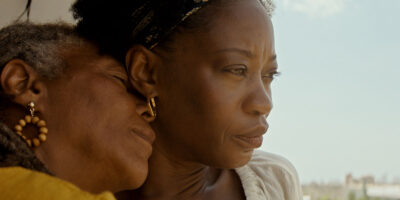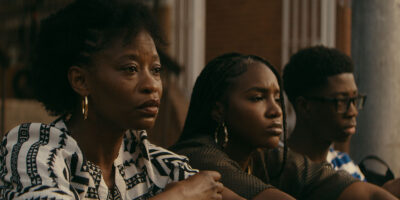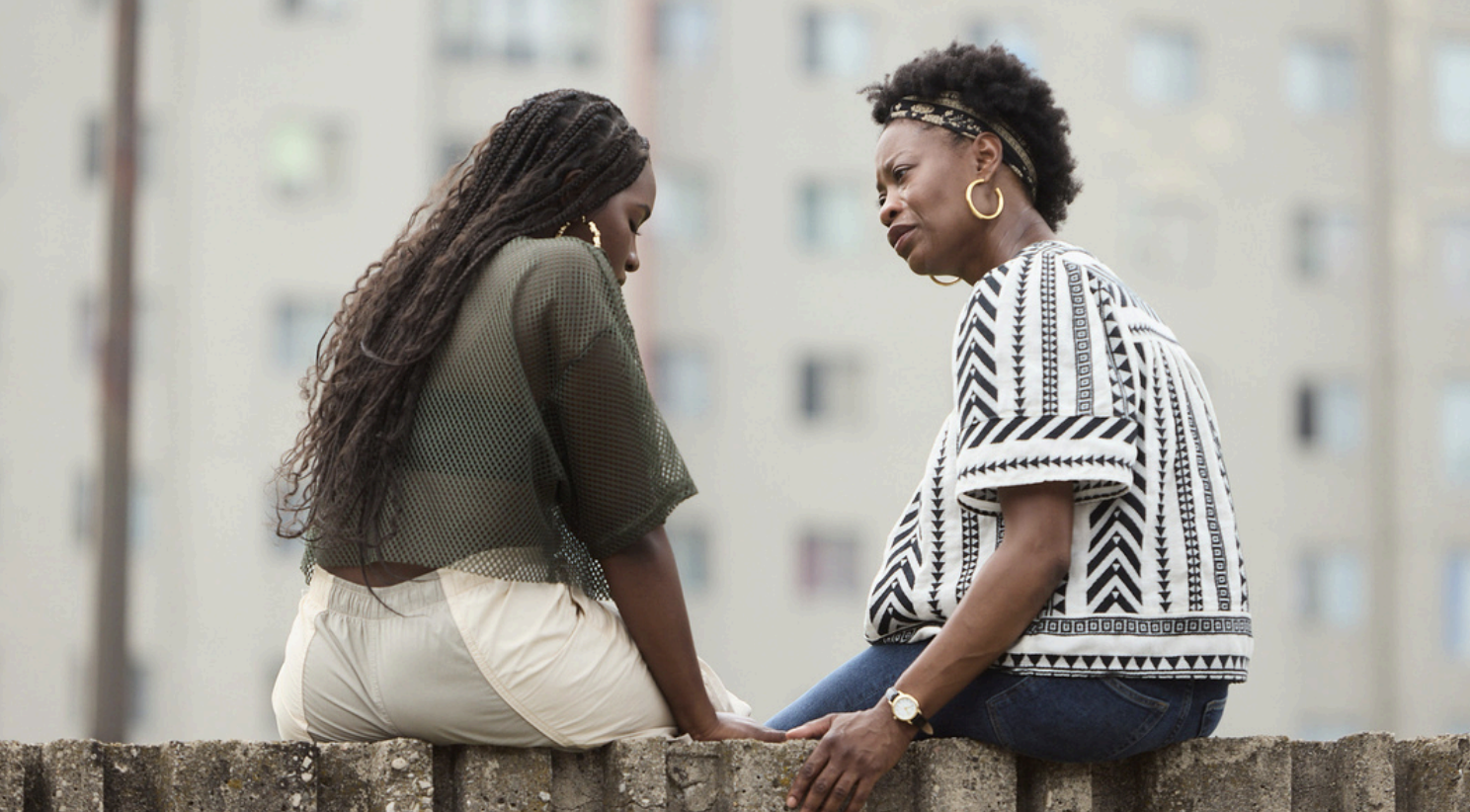Village Keeper, Karen Chapman’s deeply personal narrative feature debut, shows how hard it can be for a mother to break a cycle, especially when she’s still reeling from the lasting effects of domestic violence. The film, out in theatres on March 28, has garnered recognition on the festival circuit ever since it premiered at the 2024 Toronto International Film Festival. Most recently, it scored 7 Canadian Screen Award nominations, including for Best Motion Picture.
Jean (played by Olunike Adeliyi), is an overworked widow who lives with her elderly mother and her two teenagers at a housing complex in Toronto. As she struggles to safekeep her loved ones from the violence in the region, the character begins to unpack her own trauma and realizes that healing herself is the only way to truly protect her family.
The film focuses on the aftermath of abuse, conveying how even though the physical harm isn’t there anymore, it can still impact one’s own ability to move on. Eventually, Jean realizes that everything she is doing to break a generational pattern is futile if she isn’t taking care of herself first.
We spoke with Karen Chapman and Olunike Adeliyi about their desire to tell a different kind of story about motherhood and trauma, bringing Caribbean culture to the screen, and working alongside first-time actor Maxine Simpson.

Why did you decide to name this film Village Keeper, and why do you think this title encapsulates the story you wanted to tell?
Karen: I had some close friends that grew up in the community in which we shot, and how they spoke about their childhood was so larger than life. They played a lot, and they called the community “village”. That was one reason, and the other is that mothers hold so much, and I find that in so many ways, they’re the thread that holds everything together. The understanding is that they take care of others and that they put others first. I was curious about what that actually means, and what is the cost of that.
From the beginning of the film, you instantly know that there’s something more to Jean that the audience has yet to find out. When you were preparing for this role, how did you work with Karen to develop your character’s arc?
Olunike: My personal experiences with my own mother, my aunts, and being a mother myself, prepared me. I tend to lean on my life for a lot of my characters. I sort out the differences, but I go to the similarities first, and I’ve seen a lot of people within my community live in this way. Karen and I, we wanted to make sure that we revealed this very intimate world that Jean was living in on her own, without knowing that she was influenced by the generations before her. With some Black women, from what I’ve noticed, their depression comes in the form of working even harder. They feel that as long as I’m productive, I’m okay, but never taking the time to actually have some self-care, check in, and find awareness. There’s no therapy. We never really discussed that for many years. That’s a new thing to the community.

Karen, could you share more about your choice to not show domestic violence in the film, but rather to have it as subtext? There is a flashback or two to make sure that the audience is aware of what is happening, but the violence itself is never explicit.
Karen: At the time, I was very curious about memory and how we hold onto things that hurt us. I’ve noticed that in my experience, it’s not the violent act itself that lingers. It’s everything around it. I felt like it’s the remnants of violence that last longer than the act, and where we put that, where we hold that, and how it overflows in our lives. Nothing stays in the compartments that we think they do.
In this film, the characters’ Caribbean culture comes through in the details, like the dynamics at home or the carnival that Jean attends later on. What did it mean to you to bring this type of representation to the screen?
Karen: Within the Caribbean, we overflow. Aunties that are from here, uncles that are from there, so the borders don’t stay within the countries that we’re from. I really wanted us to feel like we’re not necessarily from one place, but a few. I wanted other cultures to see their own nuances, like how a grandmother puts the house together.
Something that I’ve always noted in the homes that I’ve visited outside of my own, is that when you are an immigrant, it’s like putting on a facade and leaving a part of yourself at home. Once you leave, you are trying to assimilate, trying to fit in, trying to navigate this world. But when you go home, you want to smell the food the moment the door opens. The smell of curry down the hall. Your mom is cooking your favourite meal. When you go home, it is your safe space.
View this post on Instagram
Maxine Simpson, who plays Grandma, had never acted before this. What was it like working with her? How did you ensure that she felt supported in her first on-set experience?
Olunike: I’m a person that believes that anybody could be an actor. It’s about bringing your personal experience, and I found with Maxine, as long as somebody’s listening, that’s what 90% of performing is. We gave her the freedom of being able to say it in Patois, and we’re like, the audience will just have to get it. When you change the dialogue into your own native language and then come back, you end up learning it more. You learn to be yourself. That’s the practice that I’ve had getting trained in the industry and I gave it to her. Once she got into that and realized, oh, the script is just a suggestion and I can do what I want, she had a ball.
Karen: Something that I knew right away is that, yes, the story is influenced by my life, but I wanted to disappear, in a sense. I didn’t want to be precious with the words. I’m so proud of her. She was so funny and a genuine joy to be around.
I’ve always wanted to run a set, to be a director that sets the tone. I believe that it is important for people to feel safe, knowing that we’re dealing with themes like domestic violence, trauma and unresolved, lingering feelings. I just wanted to make sure our cast and crew felt supported, so we got decolonial scholar, d’bi.young anitafrika, to come and share words of encouragement and remind us that if we’re not okay, that we can take a step back. I wanted to make sure that we didn’t trigger anyone, and if we did, there was an avenue for them to get help. We’re really proud that we were able to do that throughout the course of filming.
Village Keeper will screen in select theatres starting March 28.


 Follow Us On Instagram
Follow Us On Instagram

 EXCLUSIVE TICKET GIVEAWAY!
EXCLUSIVE TICKET GIVEAWAY! This Thursd
This Thursd @insideoutfestival jus
@insideoutfestival jus